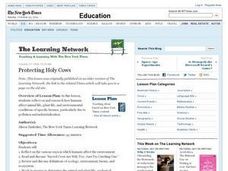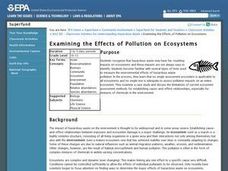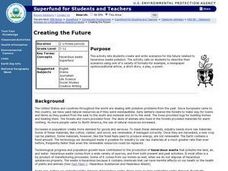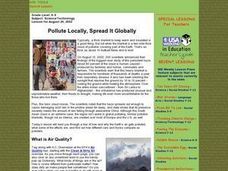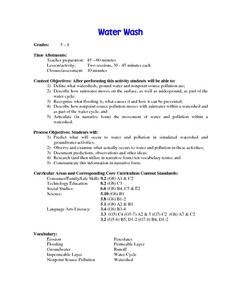Curated OER
Water Pollution Lesson Plan: All Messed Up
Students map and calculate the area of the school parking lot and then the volume of water falling on the school parking lot. They map the route surface runoff will take to the nearest water body and describe the roles that human...
Curated OER
Water Pollution Lesson Plan: What's the Flow?
Students study urban runoff. They identify the urban runoff in a simulated area and determine peak flows using charted data. Finally, they discuss possible causes of the differences in flow rates.
Curated OER
Waste Not, Want Not
Students consider the types of debris that litters beaches and conduct research on waste management. They then interview professionals in a particular field of waste management and write reports for a booklet about garbage and sewage to...
Curated OER
Protecting Holy Cows
Students study the interrelationships of organisms and their environments. They study ecological communities and determine what is necessary for survival. Students discuss and answer questions concerning a group's biome, habitat, food...
Curated OER
Oil Spill
Students explore an important role of environmental engineers by studying the Exxon Valdez oil spill. They experiment with different strategies in order to clean up their own manufactured oil spill.
Curated OER
Splish, Splash, I was Takin' a Bath!
Students explore the causes of water pollution and its effects on the environment through the use of models and scientific investigation. In the accompanying activities, they investigate filtration and aeration processes as they are used...
Curated OER
TE Activity: Oil Spill Cleanup
Students experiment by creating an oil spill and trying a number of clean up methods. They determine which methods are the least costly and most effective. They role play as an environmental engineer and as an oil company owner who must...
Curated OER
What's Down the Well?
Students examine how environmental engineers determine possible sites for drinking water wells. They listen to a teacher led-lecture, and create their own groundwater well model using a coffee can and wire screening, observing how...
Curated OER
Turning the Air Upside Down
Students analyze how engineers study temperature inversions and convection currents to understand why pollution levels may be higher in some areas than others. They participate in an experiment that allows them to build simple models to...
Curated OER
The Dirty Water Project
Students investigate different methods (aeration and filtering) for removing pollutants from water. They design and build their own water filters. Students identify the pollutants in a water sample using sight and smell, explore what...
Curated OER
Dangerous Air
Students investigate how pollution is a global issue. They locate the countries affected by radiation from Chernobyl, sequence the progress of radiation transport from Chernobyl and plot the pollution points on a world map, and read and...
Curated OER
TE Lesson: How Clean is that Water?
Middle schoolers examine the factors the affect water quality, and allow for animals and plants to live. They look at how engineers apply water quality information when making stream modifications in order to ensure drinking water...
Curated OER
The Water Cycle and Sources of Pollution
Students make an island that has a construction site on it. They spill siulated pollution and trash on top of the island and then water it to simulate rain. They will observe how the rain washes dirt, sand, and pollution off the island...
Curated OER
Examining the Effects of Pollution on Ecosystems
Students examine the different types of tests used to measure the environmental effects of hazardous waste. They work together to determine the impact of pollution on different ecosystems. They read a case study and answer questions to...
Curated OER
Creating the Future
Students work together to develop and write scenerios for the future of hazardous waste cleanup. They share their scenerios with the class. They complete activities as well.
Curated OER
Good News - We're on the Rise!
Students build and observe a simple aneroid barometer to discover changes in barometric pressure and weather forecasting. They graph changes in barometric pressure for two weeks and make weather predictions.
Curated OER
Oceans and Coasts
Students explore the topic of marine pollution. They define key vocabulary words, list examples of marine pollution, complete a true/false handout, read an article, and participate in a class discussion.
Curated OER
The Six Faces of Garbage
Students use the mathematics of surface area to approach the problem of garbage pollution from the classroom. After watching a video, students construct replicas of cereal boxes and compute their surface area.
Curated OER
Pollute Locally, Spread It Globally
Students examine the rate of pollution throughout the world through an interactive program. They define air quality and the air quality index. They examine fuel economy and its impact on the Earth and renewable and nonrenewable resources.
Curated OER
Water Wash
Students define watersheds, ground water and nonpoint source pollution. They describe how rainwater moves on the surface, as well as underground, as part of the water cycle. They recognize what flooding is as well as its causes.
Curated OER
Polluting the Environment
Fourth graders construct mini-ecosystem, pollute the ecosystem, observe, collect, and record data on the effects of these pollutants on their ecosystem, organize data on spreadsheets, create graphs, and design presentations to share with...
Curated OER
The Environment and You
First graders examine the human environmental impact and discover ways to lessen effects. They create a pollution damage flow chart and write down what they think Mother Earth might say. They create inventions from recyclable materials.
Curated OER
Water Pollution Prevention and Conservation
Students examine how to conserve water. They also discover how to prevent water pollution. They examine the Earth's water distribution as well.
Curated OER
Pollution Prevention
Students examine pollution and what causes it. They discover ways to reduce pollution and how to prevent it in the future.





